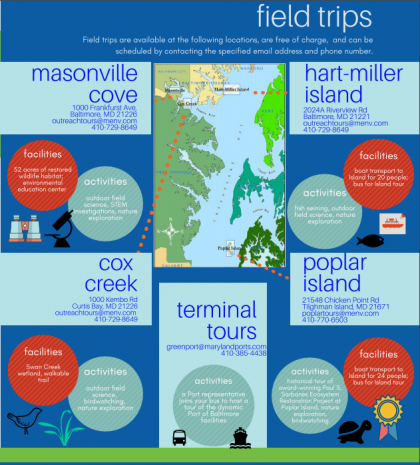
Learn about the importance of dredging and habitat restoration through hands-on activities!
Our standards-based programs are aligned with the current curriculum.
Hart-Miller Island
Recommended Age: 6 years and up
Length: 3 hours
Limited to 20 participants including teachers and chaperones
Boat Travel Required
Take a boat tour to Hart-Miller Island! Leaving from our land base located in eastern Baltimore County, our crew boat will transport your group to and from Hart-Miller Island. Once on site, students board our bus to tour the island and learn about its unique history and construction, ending with exploration at the Hart-Miller Island State Park beach. Arrangements can be made to have lunch on the island.
Masonville (Southern Baltimore City)
Recommended Age: All Ages
Length: 3-4 hours
Recommended for large groups. Students rotate through learning stations. Extensive walking (approx. 1 mile) on a rocky or mulch path.
Recommended Age: All Ages
Length: 3-4 hours
Recommended for large groups. Students rotate through learning stations. Extensive walking (approx. 1 mile) on a rocky or mulch path.
Learn about our ‘metro’ sites on the Patapsco River! Students will be introduced to Baltimore Harbor dredging projects at Masonville. Then they’ll split into groups to participate in rotating learning stations in neighboring restoration sites.
Available learning stations:
- Birding: Learn about avian visitors who are using our restoration sites as habitat. Observe birds such as bald eagles, osprey, great egrets, and more!
- Mitigation: What is mitigation? How is it important in Maryland? In this activity, students learn how Masonville is constructed and the associated mitigation projects.
- Macroinvertebrate Mayhem: What can critters tell us about the health of a stream? Learn about water quality by becoming a macroinvertebrate and playing in a survival game!
- Hot Commodities: Run a relay race to explore the concepts of international trade and habitat restoration in Maryland! Students will race their classmates to sort import products based on their country of origin.
- Osprey Odyssey: Trek around a life-sized board game to learn about the life cycle of the Osprey.
- Terrapin Travels: Explore the life cycle of the diamondback terrapin as you compete in a life-sized board game.
- Water Quality: Test parameters such as salinity, pH, dissolved oxygen, and turbidity to determine water quality.
- Who Polluted? How do everyday actions, like washing a car or dropping litter, affect Masonville Cove? Learn about point and nonpoint source pollution in this hands-on demonstration.
- Mad Libs: Students will practice identifying nouns, verbs, and adjectives as we tell silly stories about the wildlife at Masonville Cove.
- Nature Journaling: Construct a nature journal and spend time observing and reflecting on your experiences at Masonville Cove.
- Scavenger Hunt: Scour the beach in search of shells, signs of animal homes, and other treasures!
- Fancy Plants: Explore the wetlands and learn about the highly specialized plants that live there!
- Geocaching: Use handheld GPS units to search the wetland for hidden containers. Collect clues and put together a puzzle that will review what you’ve learned on your field trip!
- Trash cleanup: Participate in an action project that improves the health of our local environment, while learning about runoff, watersheds, and human impacts.


